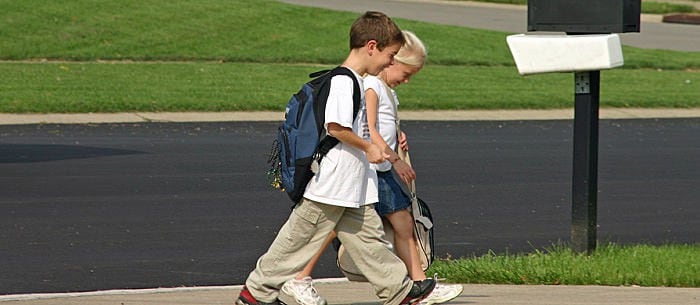While the freedom and space of playing outdoors is really important in childhood, watching the news or reading the paper can be enough to make any parent worry about their children’s safety. Here’s our advice on giving the right lessons on stranger danger for kids without making them afraid of the world.
Pre-school
Toddlers and pre-schoolers don’t have a concrete understanding of the world to fully comprehend safety for kids, but that doesn’t mean you’re off the hook as a parent. The number one thing you can do to keep your children safe is to always, always supervise them.
You can preach and preach, but it may not work with kids this young, so keeping a constant eye on children this little is key. Toddler and preschool age children can understand you when you tell them to hold your hand and stay close by while you’re out in public, so lay the groundwork for future stranger danger lectures with these lessons.
This is also a great age at which to teach your child basic kids safety. For example, every time you cross the street together, remind them to hold your hand and look both ways — and look both ways again. Ask them to look to see if any cars (or bikes, or buses) are coming. Confirm that it’s clear to cross, or point out why it’s not and wait until it is, before crossing together.
Primary school
Once children start nursery, they are old enough to memorize their full name, address and phone number with postcode. Older children should also memorize Mum’s and Dad’s mobile or work phone numbers. Make it fun by singing your address to the tune of the “ABCs” or “Twinkle, Twinkle Little Star” — add your own silly lyrics to make it more memorable. Write each number from your home phone number onto a square of paper and have your child put the squares in the correct order to help her memorize them. Give pop quizzes of this information to keep it fresh and ask them to recite it before they get dessert or while they’re in the bath.
Teach your child to be mindful of adults and explain to them that they are allowed to say “no” to grown-ups who frighten them or make them uncomfortable. You’ve probably taught your child to keep his hands and feet to himself, but the exception to this rule is if a stranger is trying to take him or do something mean to them.
If your child gets lost or needs help when you’re not there, tell them to find a trustworthy adult and teach your child that police officers are safe strangers, so children feel comfortable approaching one if they need to. If they can’t find a uniformed officer, tell them to “go to safety” by asking a mother with children or a person in a store uniform with a name tag for help. Next time you’re out, point out strangers (who are out of earshot) and ask your child if that person is someone he should consider a safe stranger. Explain why that person may not be a good option if they answers incorrectly.
It’s also helpful to role-play possible emergencies with your kids. Demonstrate how to dial 999 so that they can get help if they need it, and let them practice pushing the numbers on a toy phone or a real phone that’s been unplugged. You should also come up with a family safety word to use in case anyone other than you or your spouse needs to pick them up from school. Let them pick a word or phrase that is meaningful to them, and tell them that anyone who picks them up will know that special word.
Talking about stranger danger with your child can be scary at first, but by introducing these ideas with fun activities and role-playing scenarios, it can be a little more enjoyable. Remember, the ultimate goal is to teach children to explore the world alone and safety skills will prepare them to do so when they are old enough. Practice these tips with your child often, and you can be confident that he’ll know how to handle any situation.


